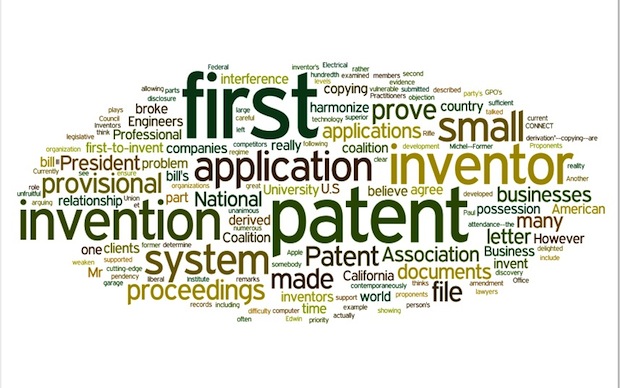Patent Reform: First-To-File Provision Survives California Challenge
WASHINGTON, March 4, 2011 — The U.S. Senate on Thursday rebuffed an effort by Sen. Dianne Feinstein, D-Calif. that would have eviscerated the current push to switch the United States’ method of awarding patents to one that is in line with the rest of the world’s.

WASHINGTON, March 4, 2011 — The U.S. Senate on Thursday rebuffed an effort by Sen. Dianne Feinstein, D-Calif. that would have eviscerated the current push to switch the United States’ method of awarding patents to one that is in line with the rest of the world’s.
The bill, S. 23, sponsored by Sen. Patrick Leahy, D-Vt, proposes to change the U.S. system to one that awards patents to those who file first for a patent, putting it in line with the way the rest of the world’s patent systems work.
Currently, the U.S. stands alone in awarding patents to those who can prove that they were the first to invent something.
Feinstein, along with fellow California Democrat Barbara Boxer, objected to the fundamental change to the U.S. system on Wednesday as they discussed the legislation on the Senate floor.
“I think this is really a battle between the small inventors beginning in the garage, like those who developed the Apple computer that was nowhere, and who, through the first-to-invent system, were able to create one of the greatest companies in the world,” Feinstein said. “America’s great strength is the cutting-edge of innovation. The first-to-invent system has served us well. If it is not broke, don’t fix it. I don’t really believe it is broke.”
Feinstein discussed the importance of the first-to-invent standard in the United States at length, as well as the importance of the associated “grace period” to independent inventors.
She said that the changes sought in the current legislation would make it much harder for inventors to prove that they were the first to come up with an idea.
“Another problem with the bill’s first to file system is the difficulty of proving that someone copied your invention,” she said.
“Currently, you as a first inventor can prove that you were first by presenting evidence that is in your control–your own records contemporaneously documenting the development of your invention,” she continued. “But to prove that somebody else’s patent application came from you under the bill, was “derived” from you, you would have to submit documents showing this copying. Only if there was a direct relationship between the two parties will the first inventor have such documents.
If there was only an indirect relationship, or an intermediary–for example, the first inventor described his invention at an angel investor presentation where he didn’t know the identities of many in attendance–the documents that would show “derivation”–copying–are not going to be in the first inventor’s possession; they would be in the second party’s possession. You would have to find out who they talked to, e-mailed with, et cetera to trace it back to your original disclosure. But the bill doesn’t provide for any discovery in these “derivation proceedings,” so the first inventor can’t prove their claim”
Feinstein also dismissed the arguments for a change in the system, noting that there are only 50 proceedings a year at the United States Patent and Trademark Office that dispute who created a new invention first.
That is a minuscule number considering that there are about 480,000 patent applications a year.
Feinstein’s amendment, and her citation of a laundry list of supporters for it, including the Silicon Valley-based Coalition for Patent Fairness, the engineering group the IEEE, the National Small Business Association, as well as Phyllis Schafly of The Eagle Forum (among many other big name ultra conservatives,) illustrates the sharp fault lines that still exist over the six-year-old effort to overhaul the nation’s patent system.
Both Sen. Orrin Hatch, R-Utah, and Leahy vigorously defended the push to change to the first-to-file system, for their part also citing numerous organizations’ support for the move.
“[Feinstein’s] amendment would gut the reforms intended by the bill, and be a poison pill to these legislative reform efforts,” said Leahy. “Supporters of the legislation, ranging from high-tech and life sciences companies, to universities and small businesses, place such a high importance on the transition to first-inventor-to-file system that many of them – including those who reside in most of our states — will not support a bill without those provisions.”
“A vote in support of this amendment, which would strike first-inventor-to-file provision, is effectively a vote against the heart of the America Invents Act,” he added.
The senators on Thursday voted 87-13 to set aside Feinstein’s bold attempt.
IBM, the largest filer for patents in the United States, applauded the development.
“We are very encouraged by the actions of the senate,” said Marian Underweiser, IBM’s counsel for intellectual property strategy and policy. “We believe the bill is a positive step to modernize our patent system.”
The senate is scheduled to start wrapping up its consideration of the legislation, and to vote to limit further debate on the legislation at the close of business Monday.
A companion House bill has yet to be introduced.
Editor’s Note: The Intellectual Property Club will host a panel discussion on patent reform in the 112th Congress March 8th. Former Federal Circuit Chief Judge Paul R. Michel will speak, as will a representative of the USPTO, BIO, and others. Join us!










Member discussion